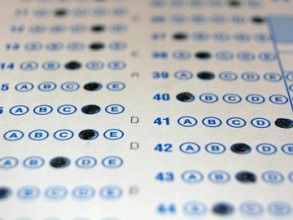CA students struggle on nationwide exams
 California fared poorly in the latest round of a bellwether series of key elementary and middle-school tests. “What’s sometimes called the Nation’s Report Card, a sampling of fourth- and eighth-graders in reading and math, painted a dismal picture of a state that insists it is prioritizing K-12 education, on which it is spending $53 billion this fiscal year,” the San Jose Mercury News noted.
California fared poorly in the latest round of a bellwether series of key elementary and middle-school tests. “What’s sometimes called the Nation’s Report Card, a sampling of fourth- and eighth-graders in reading and math, painted a dismal picture of a state that insists it is prioritizing K-12 education, on which it is spending $53 billion this fiscal year,” the San Jose Mercury News noted.
The National Assessment of Educational Progress, as the tests are formally known, ranked fourth graders in only five states, plus Washington, D.C., at as low a level of math proficiency as California’s.
The latest round of nationwide fourth and eighth grade math and reading tests yielded disappointing results. Stacked up against other states, California hovered at the lower end of the scale. “Across California, scores stagnated since 2013 at all levels — there were some small dips, which were not statistically significant,” the Los Angeles Times reported.
Laying blame
Although national and state officials alike cautioned that the trouble was hard to pinpoint, project, or trace back to root causes, some pointed the finger at the changes in testing brought on by this year’s shift toward compliance with the new Common Core Standards. “The NAEP tests aren’t completely aligned with the Common Core State Standards,” however, as state Department of Education spokesman Bill Ainsworth informed the Mercury News via email. “Consequently, we do not believe they are a good measure of California students’ progress.”
But the test results did also reveal significant racial and ethnic divergences. This year, added the Times, “between a quarter and a third of the state’s students performed at or above proficiency on the various tests; in fourth-grade reading, 4 out of 10 students were deemed to be below basic. And, fewer than 1 in 5 students of color or low-income students met or exceeded proficiency on any test.” What’s more, the paper noted, over the past three years, “California’s Latino students’ scores decreased slightly, but were flat in fourth-grade reading.”
For analysts focused on comparative racial test performance, the results turned back the clock. According to Education Week, “performance gaps between black, Hispanic and white students, in reading remained as wide in 2015 as they were in 1998. In math,” however, “the gap between black and white fourth-grade students has narrowed by about 10 points since 2000.”
Some analysts shied away from drawing too strong an inference even along lines of race. Brookings Institution senior fellow Tom Loveless told Education Week that “California’s demographics — including nearly 1.4 million students classified as English language learners — make it difficult to pinpoint the impact of the state’s school system versus other social and economic factors on results. In three of the state’s largest school districts — Fresno, Los Angeles and San Diego — achievement gaps between black, Hispanic, and white students have remained largely unchanged or even widened.”
Racial controversy
The intersection of race and education has recently occupied central, contested ground in California. In the wake of the Vergara case, which alleged civil rights violations against minority students as a consequence of protective teachers’ union policies, the political stakes have been raised in the debate over which disparities matter most and how they are to be corrected.
The controversy has magnified the significance of studies plowing similar ground. As Inside Higher Ed reported, a long-term analysis of SAT scores, released by the UC Berkeley Center for Studies in Higher Education, showed that “race and ethnicity have become stronger predictors of SAT scores than family income and parental education levels,” at least “among applicants to the University of California’s campuses.” The study’s author, Saul Geiser, concluded that admissions committees should offset the impact of the SAT by taking affirmative action criteria into account.
Related Articles
CA Democrats scale back emissions bill
In a remarkable reversal, California Democrats have dropped a main provision in landmark legislation ratcheting up emissions regulations. As Republicans cheered, liberals
Loophole Allows New Cal State Prez to Receive 20% Raise
MARCH 23, 2012 By JOHN HRABE A loophole in the California State University’s new executive compensation policy will allow new
CA Dems split on legislation mandating emissions cuts
Landmark climate legislation has run aground in Sacramento, hobbled by a rebellion among Democrats skittish of being tied by constituents to the




